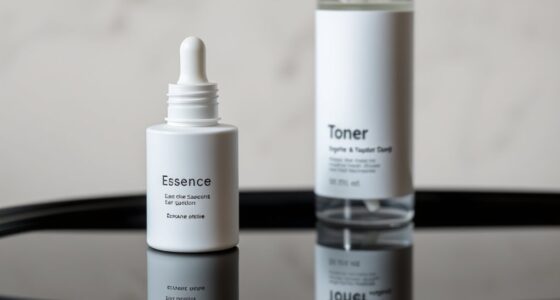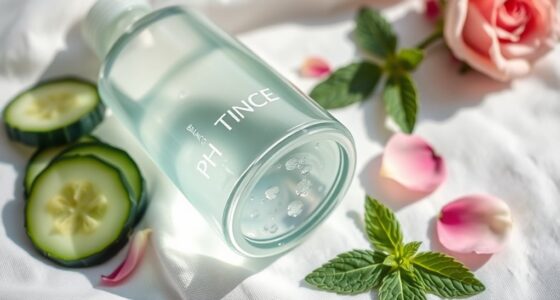You might think sunscreen is only for beach days, but that’s a myth. Harmful UV rays can reach you indoors, especially through windows. They can also affect you on cloudy days, and reflective surfaces can increase your exposure. By applying sunscreen year-round, you enhance your skin’s protective barrier and lower your risk of skin cancers. If you’re curious about the best types and application tips, there’s more important info to contemplate.
Key Takeaways
- UV rays can penetrate windows, making indoor sunscreen use essential for skin protection year-round.
- Harmful UV rays are present even on cloudy or overcast days, increasing the need for daily sunscreen.
- Reflective surfaces like water and snow can intensify indoor UV exposure, necessitating sunscreen application.
- Regular sunscreen use helps maintain the skin’s protective barrier and reduces the risk of skin cancers.
- Broad-spectrum sunscreens protect against both UVA and UVB rays, crucial for comprehensive skin defense indoors.

Sunscreen science is fundamental for anyone looking to protect their skin from harmful UV rays. You might think sunscreen is only necessary for a day at the beach, but the truth is, UV rays can penetrate indoors, especially through windows. Even on cloudy days, harmful rays are still present, making sunscreen a must for year-round use.
The sun emits two main types of UV radiation: UVA and UVB. While UVB rays cause sunburn and contribute to skin cancer, UVA rays are responsible for premature aging and skin damage. To guarantee you’re fully protected, you need a broad-spectrum sunscreen that shields against both types. Additionally, most UV risk studies focus on individuals with white skin, highlighting a need for broader research on sunscreen efficacy across different skin tones. Regular application of essential oils can also promote skin health by soothing irritation, as they provide emotional support during skincare routines. It’s important to be aware that essential oil safety guidelines should be followed to avoid skin irritation when applying oils. Moreover, understanding retirement savings plans can help you allocate funds for skincare products, including sunscreen, as an essential investment in your health. Regular use of sunscreen can significantly enhance your skin’s overall protective barrier.
Using sunscreen regularly greatly lowers your risk of skin cancers, including squamous cell carcinoma and melanoma. Some studies suggest that consistent sunscreen application can reduce squamous cell carcinoma incidence by up to 40%. So, applying sunscreen indoors isn’t just a good idea; it’s a critical step in your skincare routine.
You may also want to take into account the ingredients in your sunscreen. There are two main categories: chemical and physical. Chemical sunscreens absorb UV rays, while physical sunscreens like zinc oxide and titanium dioxide reflect them. If you have sensitive skin, you might find that physical options cause less irritation and are gentler overall.
You may not realize how reflective surfaces can increase your UV exposure indoors. For instance, water and snow can bounce UV rays, intensifying your risk even when you’re inside. This means that if you’re sitting near a window, you could still be affected by UV radiation. Since most glass doesn’t block UV rays effectively, it’s wise to incorporate sunscreen into your daily routine, regardless of the weather outside.
Applying enough sunscreen is essential for effective protection. Aim for about two tablespoons of sunscreen for your entire body, and don’t forget areas like your ears and neck.
It’s also important to reapply every two hours, or immediately after swimming or sweating. Balancing your need for sun protection with the benefits of natural sunlight, like vitamin D production, is fundamental for your overall health.
Frequently Asked Questions
Can I Use Expired Sunscreen Products?
You can use expired sunscreen products, but it’s risky.
Expired sunscreen may not provide adequate protection against harmful UV rays, increasing your chances of sunburn and skin damage.
If it’s slightly past expiration and looks fine, it might still offer some protection for a short period.
However, if it’s more than six months expired, it’s best to discard it.
Always choose fresh products to guarantee you’re getting effective sun protection.
How Often Should I Reapply Sunscreen Indoors?
Did you know that up to 50% of UV rays can still reach you indoors?
You should reapply sunscreen every 4–6 hours when you’re inside, especially if you’re near windows.
If you’re sweating or using products that increase sun sensitivity, like retinol, consider reapplying more often.
Is SPF in Makeup Sufficient for Sun Protection?
No, SPF in makeup isn’t sufficient for complete sun protection.
You often apply makeup in thin layers, which means you’re not getting the full SPF listed. Plus, most makeup lacks broad-spectrum protection against UVA rays, leaving your skin vulnerable to long-term damage.
To really protect your skin, layer a dedicated sunscreen underneath your makeup and consider reapplying with mineral powders or sprays throughout the day for added coverage.
Do Windows Block All UV Rays?
Imagine your windows as a fortress, guarding you from the sun’s relentless rays.
However, these walls aren’t impenetrable. They let up to 85% of UVA and UVB rays slip through, especially if they’re older or lack protective coatings.
So, while you might think you’re safe indoors, those UV rays can still reach you.
Investing in UV-blocking films or using curtains can enhance your defenses against skin damage lurking just beyond the glass.
Can Certain Indoor Lighting Emit Harmful UV Rays?
Yes, certain indoor lighting can emit harmful UV rays.
Fluorescent, quartz halogen, and some incandescent bulbs release varying levels of UVA and UVB rays. If you spend long hours under these lights, you may face risks like skin damage and premature aging.
To protect yourself, consider using UV-filtered lighting, applying sunscreen indoors, or installing UV-blocking window films. Taking these precautions can help guarantee your skin stays healthy while you’re indoors.
Conclusion
Just like a knight dons armor before facing a dragon, you need sunscreen even indoors to shield yourself from the invisible rays that lurk in windows and screens. Don’t let your guard down; those UV rays don’t take a break, and neither should your protection. By making sunscreen a part of your daily ritual, you’re not just safeguarding your skin—you’re ensuring your kingdom remains vibrant and healthy for years to come. Armor up, even at home!









